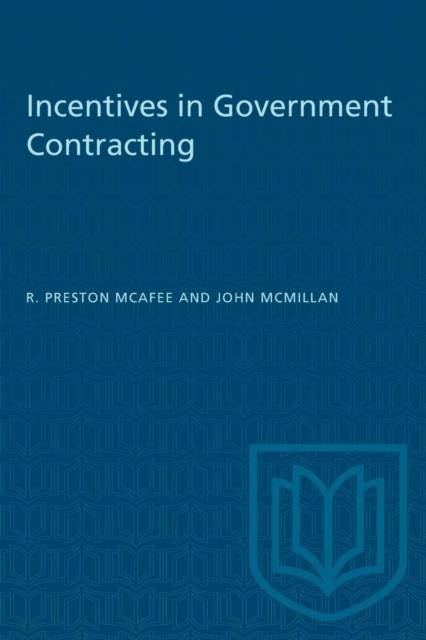
Bedankt voor het vertrouwen het afgelopen jaar! Om jou te bedanken bieden we GRATIS verzending (in België) aan op alles gedurende de hele maand januari.
- Afhalen na 1 uur in een winkel met voorraad
- In januari gratis thuislevering in België
- Ruim aanbod met 7 miljoen producten
Bedankt voor het vertrouwen het afgelopen jaar! Om jou te bedanken bieden we GRATIS verzending (in België) aan op alles gedurende de hele maand januari.
- Afhalen na 1 uur in een winkel met voorraad
- In januari gratis thuislevering in België
- Ruim aanbod met 7 miljoen producten
Zoeken
€ 35,45
+ 70 punten
Omschrijving
Could the existing level of government services by provided at a lower cost? This study presents a convincing argument for incentive contracts as a means to this end.
In a typical market economy, payments from the government to firms account for about one-half of government spending (excluding transfer payments). By changing the way in which a government pays the firms from which it procures goods and services, it would be possible to maintain the existing array of government programs at a lower price.
The major finding of this study is that governments could significantly reduce their expenditures by making extensive use of incentive contracts where they currently use either fixed-price contracts or cost-plus contracts. An incentive contract shares cost overruns and cost underruns between the government and the contractor according to a predetermined ratio. An incentive contract stimulates competition among the firms bidding for the contract and shares the project's risk between the government and the selected firm, while giving the contractor incentives to keep incurred costs low.
In addition to advocating the use of incentive contracts, the study analyses the consequences of preferential treatment for domestic content over foreign content in government procurement, discusses the choice for a government agency between producing a commodity or service in-house and contracting for its provision with a private firm, and examines the experience with contracting of both the Ontario government and the United States Department of Defense in order to draw lessons for government contracting in general.
In a typical market economy, payments from the government to firms account for about one-half of government spending (excluding transfer payments). By changing the way in which a government pays the firms from which it procures goods and services, it would be possible to maintain the existing array of government programs at a lower price.
The major finding of this study is that governments could significantly reduce their expenditures by making extensive use of incentive contracts where they currently use either fixed-price contracts or cost-plus contracts. An incentive contract shares cost overruns and cost underruns between the government and the contractor according to a predetermined ratio. An incentive contract stimulates competition among the firms bidding for the contract and shares the project's risk between the government and the selected firm, while giving the contractor incentives to keep incurred costs low.
In addition to advocating the use of incentive contracts, the study analyses the consequences of preferential treatment for domestic content over foreign content in government procurement, discusses the choice for a government agency between producing a commodity or service in-house and contracting for its provision with a private firm, and examines the experience with contracting of both the Ontario government and the United States Department of Defense in order to draw lessons for government contracting in general.
Specificaties
Betrokkenen
- Auteur(s):
- Uitgeverij:
Inhoud
- Aantal bladzijden:
- 182
- Taal:
- Engels
- Reeks:
Eigenschappen
- Productcode (EAN):
- 9781487581404
- Verschijningsdatum:
- 15/12/1988
- Uitvoering:
- Paperback
- Formaat:
- Trade paperback (VS)
- Afmetingen:
- 156 mm x 234 mm
- Gewicht:
- 285 g

Alleen bij Standaard Boekhandel
+ 70 punten op je klantenkaart van Standaard Boekhandel
Beoordelingen
We publiceren alleen reviews die voldoen aan de voorwaarden voor reviews. Bekijk onze voorwaarden voor reviews.









